Sijie Chen
Dr. Sijie Chen was Assistant Professor at Ming Wai Lau Centre for Reparative Medicine between 2017 and 2023.
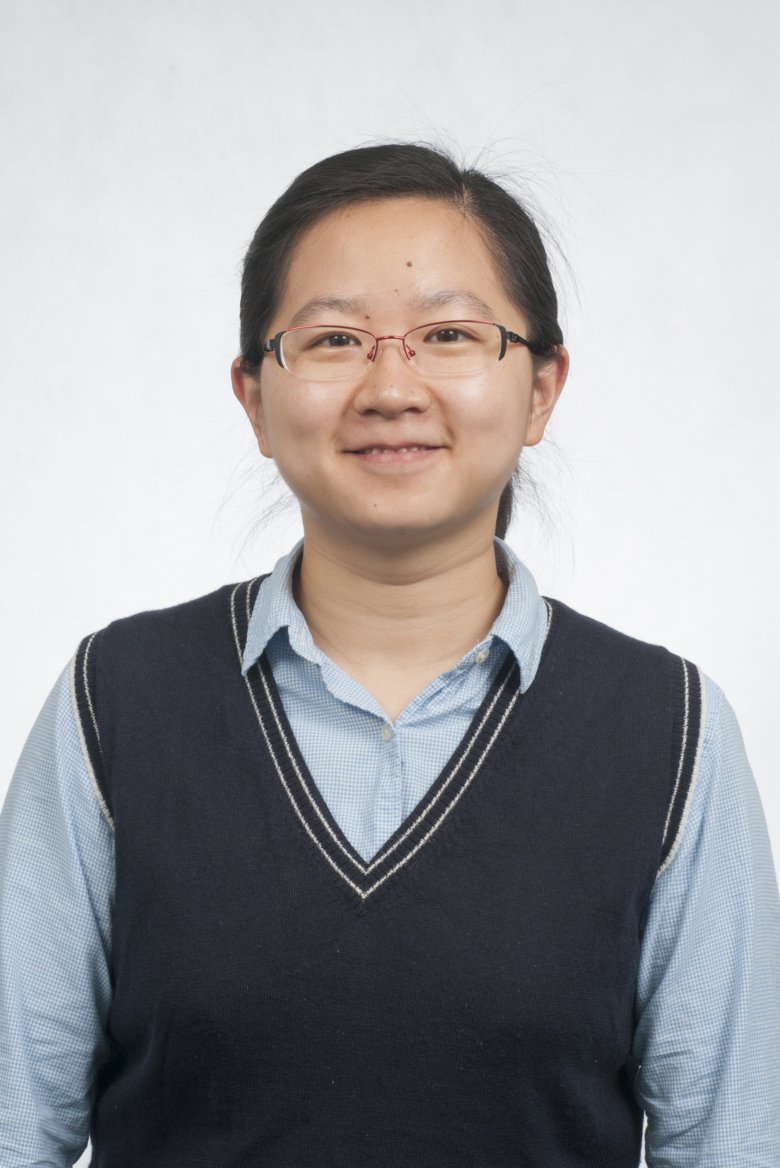
Biographical
Dr. Sijie Chen received her BSc in Biology from Wuhan University in 2009 and PhD in Bioengineering from Hong Kong University of Science and Technology (HKUST) in 2013, under the supervision of Prof Ben Zhong Tang. She worked as a Postdoctoral Fellow in HKUST and then as an Endeavour Fellow in University of Melbourne and a visiting scientist in Walter and Eliza Hall Institute of Medical Research. She joined Prof Ana Teixeira’s group as a Postdoc in the Division of Biomaterials and Regenerative Medicine at the Department of Medical Biochemistry and Biophysics in Karolinska Institutet (KI) since late 2015.
Dr Chen was earlier working on fluorescent biosensors, fluorescence imaging and nanomaterials. She has published 55 scientific papers, more than ten of which were published after she joined MWLC and with the Centre’s support.
Research
Dr. Sijie Chen's current research interests focus on the development of new luminescent materials and novel methods for studying the biological events, especially fluorescent tools for mechanobiology research.
Group Members
Previous lab members
- Dr Hui Gao, 2017-2019; Ph.D., Queen Mary University of London, UK; before join KI: The University of Leeds. Recipient of Thousand Young Talents Program (2018). 2019-now, Professor, Beihang University.
- Dr Fei Li, 2017-2019, Co-supervised with Dr Linxian Li, MWLC, KI; Ph.D., Nanjing University, China. 2019-now, Associate Professor, China Pharmaceutical University.
- Dr Sheng Xie, 2017-2019; Ph.D., Royal Institute of Technology, Sweden; before join KI: HKUST. Recipient of International Postdoc Grant (2018-2019). 2020-now, Professor, Hunan University.
- Ms Chloe Lee, Research Assistant, 2018-2020; MSc, The University of Manchester, UK. 2020.10-now, Research Associate, Lee's Pharm Genomics Lab Limited, Hong Kong
- Dr Yupeng Shi, Postdoctoral Researcher, 2020; Ph.D., Sorbonne University, France; 2021-now, Research associate professor, Zhengzhou University.
- Dr Mingyu Wu, Postdoctoral Researcher, 2018-2021.
- Mr Miller Leung, Research Assistant, 2018-2021.
- Ms Renee Chou, Research Assistant, 2019-2021.
- Dr Blake Ho, Postdoctoral Researcher, 2019-2021.
- Dr Steven Zhao, Postdoctoral Researcher, 2021-2023.
- Mr Alex Wong, Research Assistant and PhD Student, 2017-2023.
- Dr Quanzhi Yang, Postdoctoral Researcher, 2021-2023.
- Dr Deshuang Tu, Postdoctoral Researcher, 2022-2023.
- Mr Mingmin Zhang, Research Assistant, 2022-2023.
- Dr Tianbing Ren, Postdoctoral Researcher, 2022-2023.
- Dr Fei Wang, Postdoctoral Researcher, 2020-2023
- Dr Chuen Kam, Research Officer, 2019-2023
Selected Publications
Full list: Google Scholar
Wu, M.-Y., Wong, A. Y. H., Leung, J.-K., Kam, C., Wu, K. L.-K., Chan, Y.-S., Liu, K., Ip, N. Y., & Chen, S. (2021). A near-infrared AIE fluorescent probe for myelin imaging: From sciatic nerve to the optically cleared brain tissue in 3D. Proceedings of the National Academy of Sciences, 118 (45) e2106143118.
https://doi.org/10.1073/pnas.2106143118
Wu, M.-Y., Gu, M., Leung, J.-K., Li, X., Yuan, Y., Shen, C., Wang, L., Zhao, E., & Chen, S. (2021). A Membrane-Targeting Photosensitizer with Aggregation-Induced Emission Characteristics for Highly Efficient Photodynamic Combat of Human Coronaviruses. Small, 17(30), 2101770.
https://doi.org/10.1002/smll.202101770
Ho, P.-Y., Lee, S.-Y., Kam, C., Zhu, J., Shan, G.-G., Hong, Y., Wong, W.-Y., & Chen, S., (2021). Fluorescence Imaging and Photodynamic Inactivation of Bacteria Based on Cationic Cyclometalated Iridium(III) Complexes with Aggregation-Induced Emission Properties. Adv. Healthcare Mater. 2100706.
https://doi.org/10.1002/adhm.202100706
Zhao, E., Kam, C., Wu, M., Wang, E., Wang, J., Tang, B. Z., & Chen, S. (2021). An Aggregation-Induced Emission Optical Highlighter for the Studies of Endoplasmic Reticulum-Lipid Droplet Content Dynamics. CCS Chemistry.
https://doi.org/10.31635/ccschem.021.202101143
Wu, M., Leung, J., Liu, L., Kam, C., Chan, K. Y. K., Li, R. A., Feng, S., & Chen, S. (2020). A Small‐Molecule AIE Chromosome Periphery Probe for Cytogenetic Studies. Angewandte Chemie International Edition, 59(26), 10327–10331.
https://doi.org/10.1002/anie.201916718
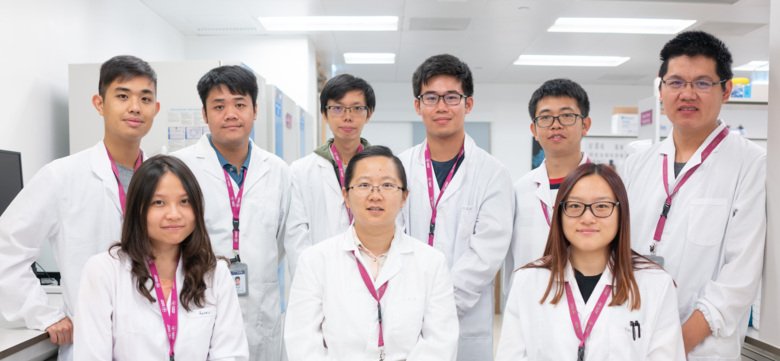 Photo: Patrick Chan
Photo: Patrick ChanSijie Chen’s new publication in Science Advances
Sijie Chen Lab has developed a new fluorescent mechanosensitive probe. This probe simultaneously labeled the plasma membrane and mitochondria of the living HeLa cells. By fluorescence lifetime imaging, membrane tension changes in both organelles under different conditions can be visualized. This expands the research tool available for mechanobiological studies.
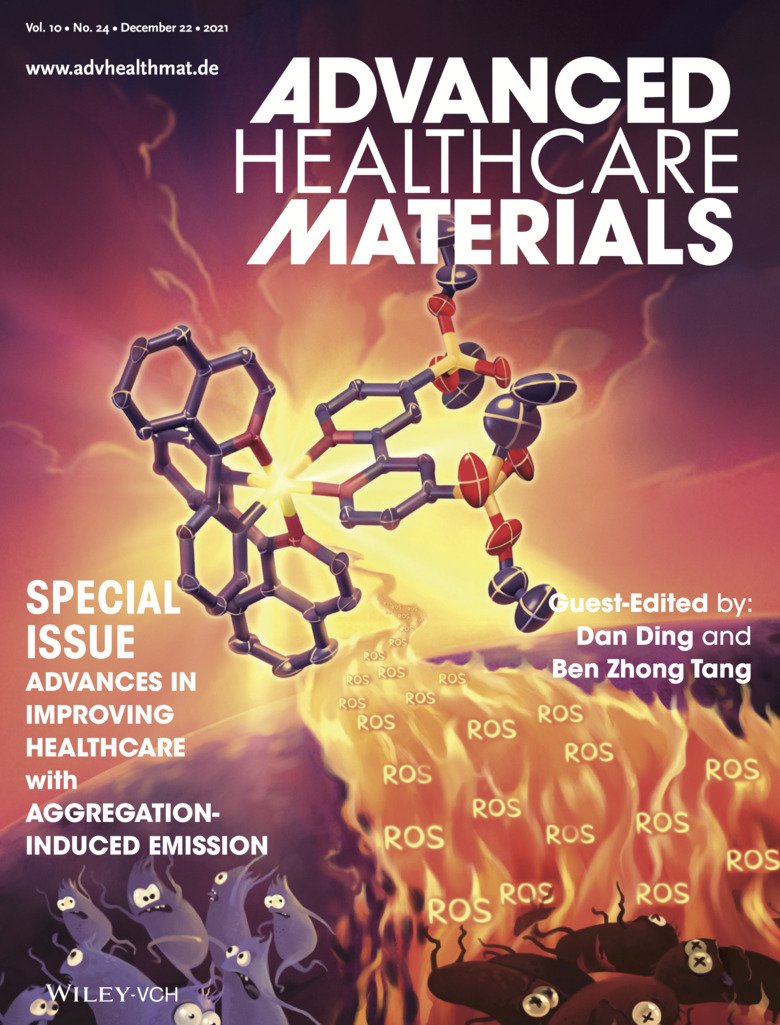 Photo: Sijie Chen
Photo: Sijie ChenSijie Chen’s research paper gets highlighted as front cover in Advanced Healthcare Materials
Sijie Chen Lab and their collaborators have designed and synthesized a series of cationic cyclometalated Iridium(III) complexes with aggregation-induced emission (AIE) properties. These phosphorescent agents can be utilized to stain both Gram-positive and Gram-negative bacteria and to inactivate the bacteria in a photodynamic process. This manuscript is highlighted as the front cover of Advanced Healthcare Materials, issue 24, 2021.
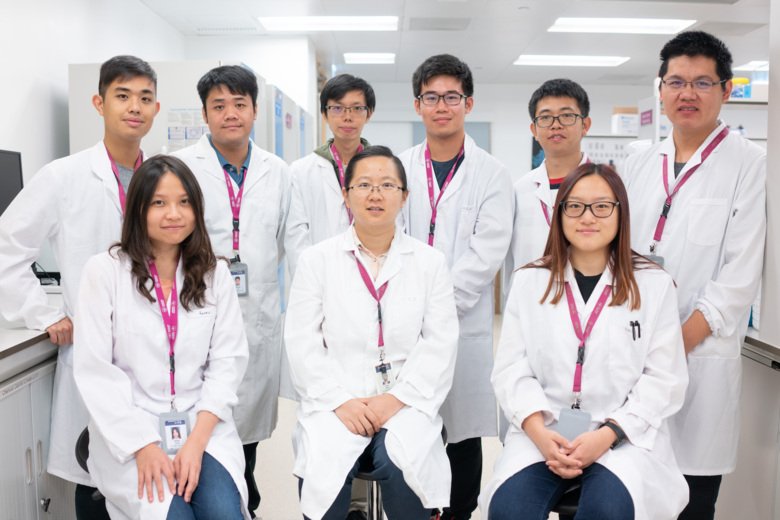 Photo: Patrick Chan
Photo: Patrick ChanSijie Chen’s new publication in PNAS
Myelin is a lipid-rich layer wrapping around the axon of neurons which increases the speed of electrical impulses in the brain and the spinal cord. To better visualize these myelinated structures, the Sijie Chen Lab has developed a new AIE-active fluorescent probe, PM-ML, for the staining and imaging of myelin. The staining is compatible with commonly used tissue-clearing methods. The high-contrast images of the myelinated structures acquired allow successful identification and tracking of these myelinated nerve fibres in the nervous system. This may deepen our understanding of three-dimensional neural networks in brains and the histopathology of demyelinating diseases in future neurological studies.
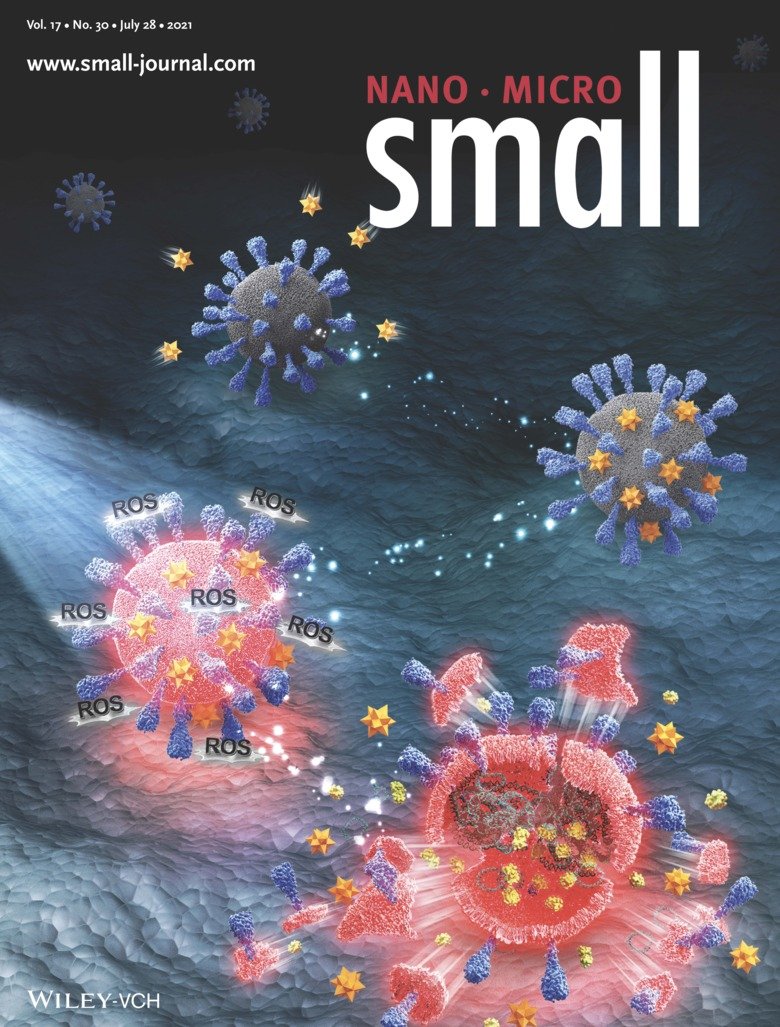 Photo: Sijie Chen
Photo: Sijie ChenSijie Chen’s research paper gets highlighted as back cover in Small
Sijie Chen and her group have developed a novel membrane-targeting photosensitizer (DTTPB) with aggregation-induced emission characteristics for efficient photodynamic inactivation of human coronaviruses upon white-light irradiation. This manuscript is highlighted as the back cover of Small, issue 30, 2021.
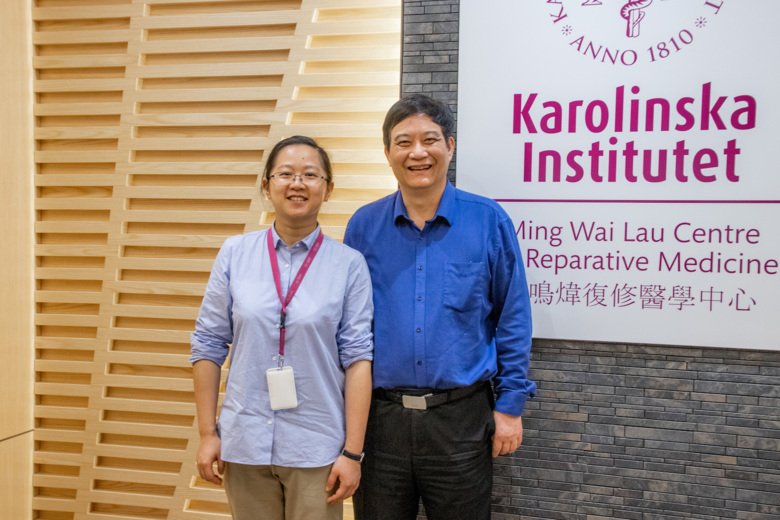 Photo: Patrick Chan
Photo: Patrick ChanSijie Chen collaborates with local universities in getting CRF 2020/21
Sijie Chen is one of the co-investigators together with Prof Ben Zhong Tang, our MWLC associate member, who is the main applicant for the application titled “New Aggregation-Induced Emission Systems: Solving the Existing Problems in Bioimaging and Developing New Biological Applications”. The application has been awarded HKD 6,400,000 from Research Grants Council (RGC) under the Collaborative Research Fund (CRF) Scheme (2020/21). The team comprises eight faculty members from five institutes with complementary expertise in organic chemistry, photochemistry, biology, and medicine. They aim to develop new AIEgens with emission in the second near-infrared window, persistent room-temperature phosphorescence and chemiluminescence. These molecules are anticipated to solve the existing problems in bioimaging.
 Photo: Hui Gao
Photo: Hui GaoSijie Chen's research paper gets highlighted as the cover
Sijie Chen and her group have developed a simple and cost-effective method for rapid fabrication of a thermosensitive fluorescent nanoprobe based on the aggregation-induced emission (AIE) mechanism. This paper is highlighted as the outside back cover of nanoscale horizons, issue 3, 2020.
